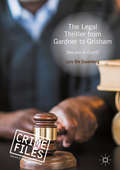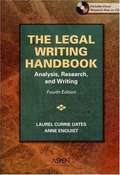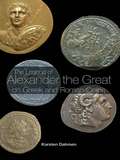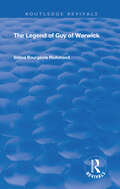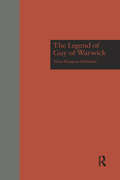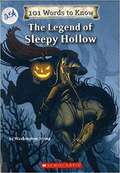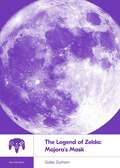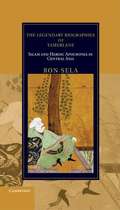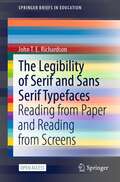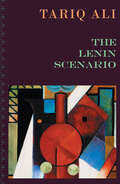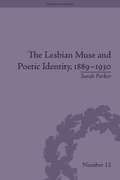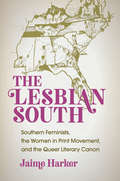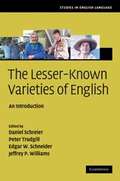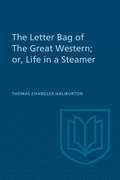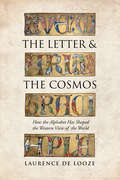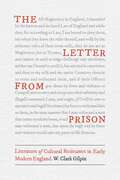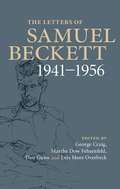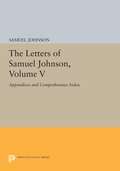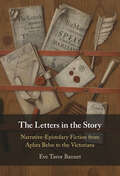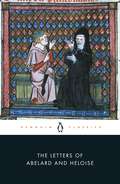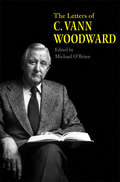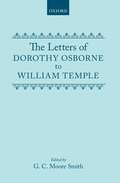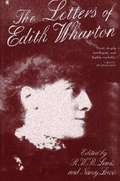- Table View
- List View
The Legal Thriller from Gardner to Grisham
by Lars Ole SauerbergThis book offers a critically informed yet relaxed historical overview of the legal thriller, a unique contribution to crime fiction where most of the titles have been written by professionals such as lawyers and judges. The legal thriller typically uses court trials as the suspense-creating background for presenting legal issues reflecting a wide range of concerns, from corporate conflicts to private concerns, all in a dramatic but highly informed manner. With authors primarily from the USA and the UK, the genre is one which nonetheless enjoys a global reading audience. As well as providing a survey of the legal thriller, this book takes a gender-focused approach to analyzing recently published titles within the field. It also argues for the fascination of the legal thriller both in the way its narrative pattern parallels that of an actual court trial, and by the way it reflects, frequently quite critically, the concerns of contemporary society.
The Legal Writing Handbook: Analysis, Research, and Writing
by Anne Enquist Laurel Currie OatesStudents and professors will welcome this new edition of the only text for legal writing and research that covers all three key components of the first-year course -- research, writing, and analysis.
The Legend of Alexander the Great on Greek and Roman Coins
by Karsten DahmenThis outstanding introductory survey collects, presents and examines, for the very first time, the portraits and representations of Alexander the Great on the ancient coins of the Greek and Roman period. From 320 BC to AD 400, Karsten Dahmen examines not only Alexander’s own coinage and the posthumous coinages of his successors, but also the re-use of his image by rulers from the Greek world and the Roman empire, to late antiquity. Also including numismatic material that exceeds all previous published works, and well-illustrated, this historical survey brings Alexander and his legacy to life.
The Legend of Guy of Warwick (Garland Studies In Medieval Literature Ser.)
by Velma Bourgeois RichmondFirst published in 1996. This lavishly illustrated study is a comprehensive literary and social history which offers a record of changing genres, manuscript/book production, and cultural, political, and religious emphases by examining one of the most long lived popular legends in England. Guy of Warwick became part of history when he was named in chronicles and heraldic rolls. The power of the Earls of Warwick, especially Richard de Beauchamp, inspired the spread of the legend, but Guy's highest fame came in the Renaissance as one of the Nine Worthies. Widely praised in texts and allusions, Guy's feats were sung in ballads and celebrated on the stage in England and France.The first Anglo-Norman romance of Gui de Warewic, a Saxon hero of the tenth century was written in the early 13th century; the latest retellings of the legend are contemporary. Examples of Guy's legend can be found in two English translations that survived the Middle Ages, a new French prose romance, a didactic tale in the Gesta Romanorum, and late medieval versions in Celtic, German, and Catalan, as well as English. Guy remained a favorite Edwardian children's story and was featured in the Warwick Pageant, an historical extravaganza of 1906. The patriotism of World War II sparked a resurgence of interest that produced several new versions, mostly folkloric.
The Legend of Guy of Warwick (Garland Studies in Medieval Literature #14)
by Velma Bourgeois RichmondThis lavishly illustrated study is a comprehensive literary and social history which offers a record of changing genres, manuscript/book production, and cultural, political, and religious emphases by examining one of the most long lived popular legends in England. Guy of Warwick became part of history when he was named in chronicles and heraldic rolls. The power of the Earls of Warwick, especially Richard de Beauchamp, inspired the spread of the legend, but Guy's highest fame came in the Renaissance as one of the Nine Worthies. Widely praised in texts and allusions, Guy's feats were sung in ballads and celebrated on the stage in England and France.The first Anglo-Norman romance of Gui de Warewic, a Saxon hero of the tenth century was written in the early 13th century; the latest retellings of the legend are contemporary. Examples of Guy's legend can be found in two English translations that survived the Middle Ages, a new French prose romance, a didactic tale in the Gesta Romanorum, and late medieval versions in Celtic, German, and Catalan, as well as English. Guy remained a favorite Edwardian children's story and was featured in the Warwick Pageant, an historical extravaganza of 1906. The patriotism of World War II sparked a resurgence of interest that produced several new versions, mostly folkloric.
The Legend of Sleepy Hollow (101 Words to Know)
by Washington IrvingThis classic scary story features 101 challenging vocabulary words that everyone going into the 4th grade should know. Definitions are included, as well as word puzzles and games. And the story of Ichabod Crane's wild ride through Sleepy Hollow as he attempts to escape from a terrifying ghost is just plain fun to read!
The Legend of Zelda: Majora's Mask (Boss Fight Books)
by Gabe DurhamYou&’ve met with a terrible fate, haven&’t you? Those grim words hang over the entirety of Majora Mask, the sixth entry in the Legend of Zelda series. In his darkest adventure, Link must relive the same three days over and over again to prevent the moon from colliding into the kingdom of Termina and ending the world. Made with a small team in a single year for the Nintendo 64 from the assets of its predecessor, Majora&’s Mask could have been a shameless cash-in—but instead has gained wide recognition as the most mysterious, mature, and touching game in the series. It&’s also the Zelda game that has inspired more inventive fan theories and bone-chilling internet horror stories than might be expected from a high-fantasy adventure. Through rigorous research and a new in-depth interview with Majora&’s North American localizer, Jason Leung, writer and editor Gabe Durham investigates the relationship between Majora&’s fast-paced, adaptive development and the meaning projected onto its story by players—and shines a light on the strange and tumultuous romance between art and fandom.
The Legendary Biographies of Tamerlane
by Ron SelaTimur (or Tamerlane) is famous as the fourteenth-century conqueror of much of Central Eurasia and the founder of the Timurid dynasty. His reputation lived on in his native lands and reappeared some three centuries after his death in the form of fictional biographies, authored anonymously in Persian and Turkic. These biographies have become part of popular culture. Despite a direct continuity in their production from the eighteenth century to the present, they remain virtually unknown to people outside the region. This remarkable and rigorous scholarly appraisal of the legendary biographies of Tamerlane is the first of its kind in any language. The book sheds light not only on the character of Tamerlane and how he was remembered and championed by many generations after his demise, but also on the era in which the biographies were written, and how they were conceived and received by the local populace during an age of crisis in their own history.
The Legends of the Saints in Old Norse-Icelandic Prose
by Kirsten WolfSaints' legends form a substantial portion of Old Norse-Icelandic literature, and can be found in more than four hundred manuscripts or fragments of manuscripts dating from shortly before the twelfth century to the 1700s. With The Legends of the Saints in Old Norse-Icelandic Prose, Kirsten Wolf has undertaken a complete revision of the fifty-year-old handlist The Lives of the Saints in Old Norse Prose. This updated handlist organizes saints' names, manuscripts, and editions of individual lives with references to the approximate dates of the manuscripts, as well as modern Icelandic editions and translations. Each entry concludes with secondary literature about the legend in question. These features combine to make The Legends of the Saints in Old Norse-Icelandic Prose an invaluable resource for scholars and students in the field.
The Legibility of Serif and Sans Serif Typefaces: Reading from Paper and Reading from Screens (SpringerBriefs in Education)
by John T. RichardsonThis open access book provides a detailed and up-to-date account of the relevant literature on the legibility of different kinds of typefaces, which goes back over 140 years in the case of reading from paper and more than 50 years in the case of reading from screens. It describes the origins of serif and sans serif styles in ancient inscriptions, their adoption in modern printing techniques, and their legibility in different situations and in different populations of readers. It also examines recent research on the legibility of serif and sans serif typefaces when used with internet browsers, smartphones and other hand-held devices. The book investigates the difference in the legibility of serif typefaces and sans serif typefaces when they are used to produce printed material or when they are used to present material on computer monitors or other screens and it explores the differences in readers’ preferences among typefaces. The book’s main focus is on the psychology of reading, but there are clear implications for education and publishing. Indeed, the book can be read with benefit by anyone concerned with communicating with others through written text, whether it is printed on paper or displayed on computer screens.
The Lenin Scenario
by Tariq AliThe revolutionary world leader&’s extraordinary life, published for the centenary of Lenin&’s deathCommissioned by Oliver Stone in 2015 to commemorate the Russian Revolution, Tariq Ali&’s captivating screenplay of the life and times of Vladimir Lenin puts flesh on the bones of the historical record and gets its pulse racing. From the author of The Dilemmas of Lenin, the drama captures the enigma of its central character. Ali shows Lenin in his rush from Switzerland to Petrograd by train to grasp his moment in history and the force of his personality on the tumult he found there. He made a revolution and remade a nation. Interwoven with the politics is an exploration of Lenin&’s personal life, especially his love for Inessa Armand.In the introduction, Ali argues that, despite the difficulties, a serious cinematic assessment of Lenin is still needed. Unfortunately, two very different attempts to film one failed. This first draft provides the basis for something on a grander scale at some stage in the future.Praise for The Dilemmas of Lenin &‘Aims to rescue Lenin from both liberal caricature and Soviet hag- iography by recovering the realism and dynamism of his political thought&’ David Sessions, Nation&‘An incredibly powerful, panoramic, and insightful study of the central revolutionary figure of the twentieth century&’ Paul LeBlanc, author of Lenin and the Revolutionary Party
The Lesbian Muse and Poetic Identity, 1889–1930 (Gender and Genre #12)
by Sarah ParkerThroughout history the poetic muse has tended to be (a passive) female and the poet male. This dynamic caused problems for late Victorian and twentieth-century women poets; how could the muse be reclaimed and moved on from the passive role of old? Parker looks at fin-de-siècle and modernist lyric poets to investigate how they overcame these challenges and identifies three key strategies: the reconfiguring of the muse as a contemporary instead of a historical/mythological figure; the muse as a male figure; and an interchangeable poet/muse relationship, granting agency to both.
The Lesbian South: Southern Feminists, the Women in Print Movement, and the Queer Literary Canon
by Jaime HarkerIn this book, Jaime Harker uncovers a largely forgotten literary renaissance in southern letters. Anchored by a constellation of southern women, the Women in Print movement grew from the queer union of women's liberation, civil rights activism, gay liberation, and print culture. Broadly influential from the 1970s through the 1990s, the Women in Print movement created a network of writers, publishers, bookstores, and readers that fostered a remarkable array of literature. With the freedom that the Women in Print movement inspired, southern lesbian feminists remade southernness as a site of intersectional radicalism, transgressive sexuality, and liberatory space. Including in her study well-known authors—like Dorothy Allison and Alice Walker—as well as overlooked writers, publishers, and editors, Harker reconfigures the southern literary canon and the feminist canon, challenging histories of feminism and queer studies to include the south in a formative role.
The Lesbian in Literature: A Bibliography (3rd Edition)
by Barbara GrierA comprehensive listing of books by or about lesbians, prior to 1981. It includes some seven thousand titles, with annotations and a rating system to help the reader determine a book's significance.
The Lesser-Known Varieties of English
by Daniel Schreier Peter Trudgill Edgar W. Schneider Jeffrey P. WilliamsThis is the first ever volume to compile sociolinguistic and historical information on lesser-known, and relatively ignored, native varieties of English around the world. Exploring areas as diverse as the Pacific, South America, the South Atlantic and West Africa, it shows how these varieties are as much part of the big picture as major varieties and that their analysis is essential for addressing some truly important issues in linguistic theory, such as dialect obsolescence and death, language birth, dialect typology and genetic classification, patterns of diffusion and transplantation and contact-induced language change. It also shows how close interwoven fields such as social history, contact linguistics and variationist sociolinguistics are in accounting for their formation and maintenance, providing a thorough description of the lesser-known varieties of English and their relevance for language spread and change.
The Letter Bag of The Great Western;: or, Life in a Steamer
by Douglas Lochhead Thomas HaliburtonAside from Sam Slick, the book which gained Haliburton the greatest notoriety was The Letter Bag of The Great Western; or, Life in a Steamer, published in 1840. Much of this book was composed for the diversion of the other passengers on Haliburton’s steamship voyage from Bristol to New York in 1839. The book’s ostensible function was the advertisement of the advantages of travel by steamship, but few, after reading the passengers’ accounts of their voyage, would, if they took them seriously, ever venture off shore. The book’s principal sources of amusement – infirmities of the human body (seasickness), the peculiarities of spelling and grammar that arise from faulty or defective education, the cultural mores of other races and lower classes, and the outrageous punning.
The Letter and the Cosmos: How the Alphabet Has Shaped the Western View of the World
by Laurence N de LoozeFrom our first ABCs to the Book of Revelation's statement that Jesus is "the Alpha and Omega," we see the world through our letters. More than just a way of writing, the alphabet is a powerful concept that has shaped Western civilization and our daily lives. In The Letter and the Cosmos, Laurence de Looze probes that influence, showing how the alphabet has served as a lens through which we conceptualize the world and how the world, and sometimes the whole cosmos, has been perceived as a kind of alphabet itself. Beginning with the ancient Greeks, he traces the use of alphabetic letters and their significance from Plato to postmodernism, offering a fascinating tour through Western history.A sharp and entertaining examination of how languages, letterforms, orthography, and writing tools have reflected our hidden obsession with the alphabet, The Letter and the Cosmos is illustrated with copious examples of the visual and linguistic phenomena which de Looze describes. Read it, and you'll never look at the alphabet the same way again.
The Letter from Prison: Literature of Cultural Resistance in Early Modern England
by W. Clark GilpinLetters from prison testifying to deeply felt ethical principles have a long history, extending from antiquity to the present day. In the early modern era, the rise of printing houses helped turn these letters into a powerful form of political and religious resistance. W. Clark Gilpin’s fascinating book examines how letter writers in England—ranging from archbishops to Quaker women—consolidated the prison letter as a literary form.Drawing from a large collection of printed prison letters written from the reign of Henry VIII to the closing decades of the seventeenth century, Gilpin explores the genre's many facets within evolving contexts of reformation and revolution. The writers of these letters portrayed the prisoner of conscience as a distinct persona and the prison as a place of redemptive suffering where bearing witness had the power to change society.The Letter from Prison features a diverse cast of characters and a literary genre that combines drama and inspiration. It is sure to appeal to those interested in early modern England, prison literature, and cultural forms of resistance.
The Letters Of Samuel Beckett, 1941-1956
by Samuel Beckett Martha Dow Fehsenfeld Lois More Overbeck George Craig Dan GunnThis second volume of The Letters of Samuel Beckett opens with the war years, when it was often impossible or too dangerous to correspond. The surge of letters beginning in 1945, and their variety, are matched by the outpouring and the range of Beckett's published work. Primarily written in French and later translated by the author, the work includes stories, a series of novels (Molloy, Malone meurt and L'Innommable), essays and plays - most notably En attendant Godot. The letters chronicle a passionately committed but little known writer evolving into a figure of international reputation, and his response to such fame. The volume provides detailed introductions which discuss Beckett's situation during the war and his crucial move into the French language, as well as translations of the letters, explanatory notes, year-by-year chronologies, profiles of correspondents and other contextual information.
The Letters Of Samuel Johnson, Volume V: Appendices And Comprehensive Index (Princeton Legacy Library #270)
by Bruce RedfordWith these two volumes Princeton University Press concludes the first scholarly edition of the letters of Samuel Johnson to appear in forty years. Volume IV chronicles the last three years of Johnson's life, an epistolary endgame that includes the breakup of the friendship with Hester Thrale and a poignant reaching out to new friends and new experiences. Volume V includes not only the comprehensive index but those undated letters that cannot confidently be assigned to a specific year, "ghost" letters (those whose existence is documented in other sources), three letters that have recently been recovered, and translations of Johnson's letters in Latin. Bruce Redford is Professor of English at the University of Chicago and the author of The Converse of the Pen: Acts of Intimacy in the Eighteenth-Century Familiar Letter (Chicago).
The Letters in the Story: Narrative-Epistolary Fiction from Aphra Behn to the Victorians
by Eve Tavor BannetThe long tradition of mixta-genera fiction, particularly favoured by women novelists, which combined fully-transcribed letters and third-person narrative has been largely overlooked in literary criticism. Working with recognized formal conventions and typical thematic concerns, Tavor Bannet demonstrates how narrative-epistolary novels opposed the real, situated, transactional and instrumental character of letters, with their multi-lateral relationships and temporally shifting readings, to merely documentary uses of letters in history and law. Analyzing issues of reading and misreading, knowledge and ignorance, communication and credulity, this study investigates how novelists adapted familiar romance plots centred on mysteries of identity to test the viability of empiricism's new culture of fact and challenge positivism's later all-pervading regime of truth. Close reading of narrative-epistolary novels by authors ranging from Aphra Behn and Charlotte Lennox to Frances Burney and Wilkie Collins tracks transgenerational debates, bringing to light both what Victorians took from their eighteenth-century forbears and what they changed.
The Letters of Abelard and Heloise: Tr. From The Original Latin And Now Reprinted From The Edition Of 1722
by Peter AbelardThe story of Abelard and Heloise remains one of the world's most celebrated and tragic love affairs. Through their letters, we follow the path of their romance from its reckless and ecstatic beginnings when Heloise became Abelard's pupil, through the suffering of public scandal and enforced secret marriage, to their eventual separation.
The Letters of C. Vann Woodward
by C. Vann Woodward Michael O'BrienC. Vann Woodward was one of the most prominent and respected American historians of the twentieth century. He was also a very gifted and frequent writer of letters, from his earliest days as a young student in Arkansas and Georgia to his later days at Yale when he became one of the arbiters of American intellectual culture. For the first time, his sprightly, wry, sympathetic, and often funny letters are published, including those he wrote to figures as diverse as John Kennedy, David Riesman, Richard Hofstadter, and Robert Penn Warren. The letters shed new light not only on Woodward himself, but on what it meant to be an American radical and public intellectual, as well as on the complex politics and discourse of the historical profession and the anxious modulations of Southern culture.
The Letters of Dorothy Osborne to William Temple
by G. C. Moore SmithA scholarly edition of the letters of Dorothy Osborne to William Temple. The edition presents an authoritative text, together with an introduction, commentary notes, and scholarly apparatus.
The Letters of Edith Wharton
by Edith WhartonA careful selection, including Wharton's "major" letters that are often quoted, and for the first time, a substantial portion of her correspondence with Morton Fullerton, with whom she had an affair while in her mid-40s.
